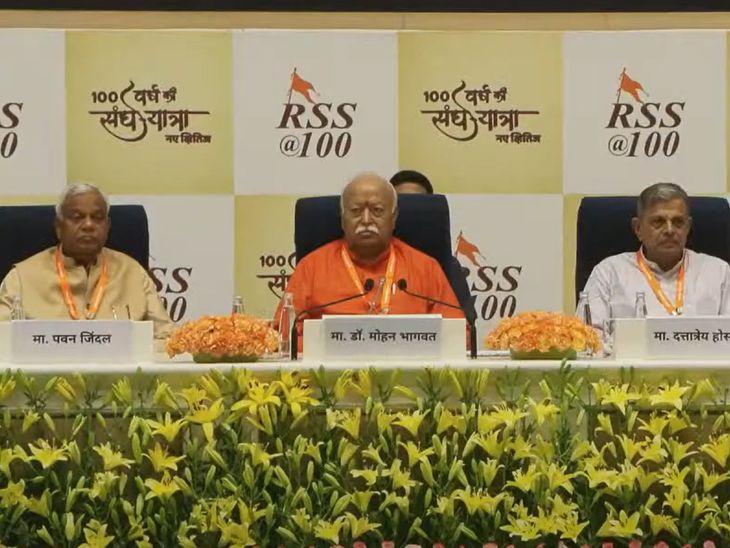- Hindi news
- National
- Solicitor General said, the order to impose deadline on President and Governor is Wrong
New DelhiA few moments ago
- Copy link
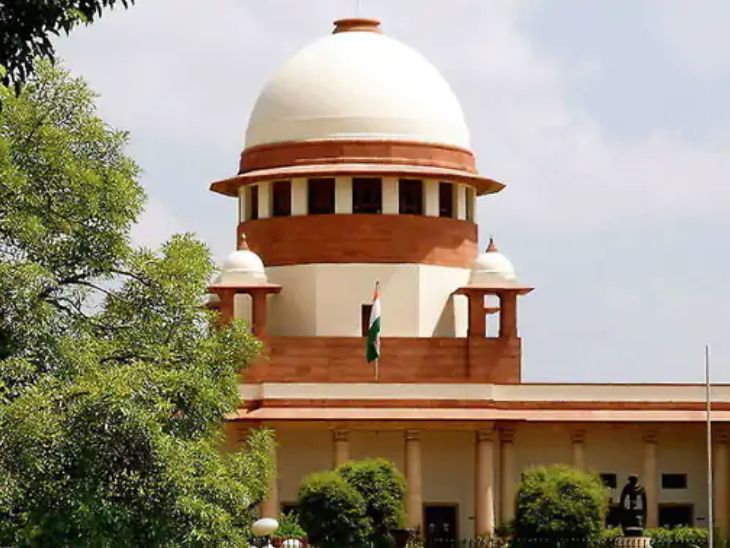
The Supreme Court on Thursday completed the hearing on the petitions that fixed the deadline for approval of the President and the Governor. The court has reserved the verdict after 10 days of arguments.
On the last day of the hearing, Solicitor General Tushar Mehta said that the court should make it clear that the decision to decide the Deadline of the President and Governor of the Governor of 2 judges on 8 April is not correct. They said,

If that decision is considered correct, then in future a large number of petitions will enter the court and the burden on the judiciary will increase.

Senior advocates Kapil Sibal and Arvind Datar opposed the Center’s argument. He said that the President did not ask any question about this, so the Supreme Court should not consider this issue.
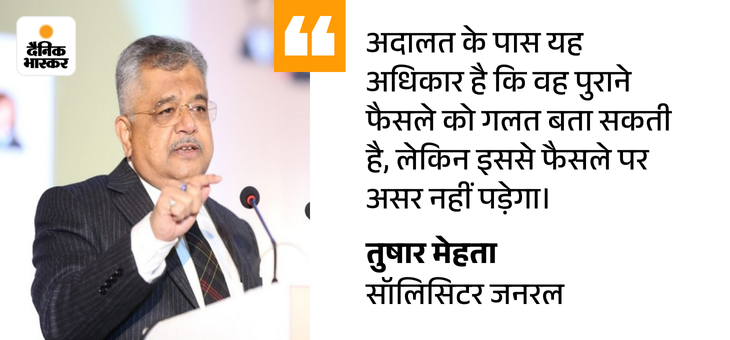
CJI led by 5 judges led by CJI
In place of Chief Justice DY Chandrachud, the constitution bench led by Chief Justice BR Gavai heard the case. The back consisted of Justices Suryakant, Vikram Nath, PS Narasimha and AS Chandrachudkar. The hearing started from August 19.
During the hearing, Attorney General R Venkatramani and Solicitor General Tushar Mehta put the side of the central government. At the same time, the opposition -ruled states of Tamil Nadu, West Bengal, Kerala, Karnataka, Telangana, Punjab and Himachal Pradesh opposed the Center.
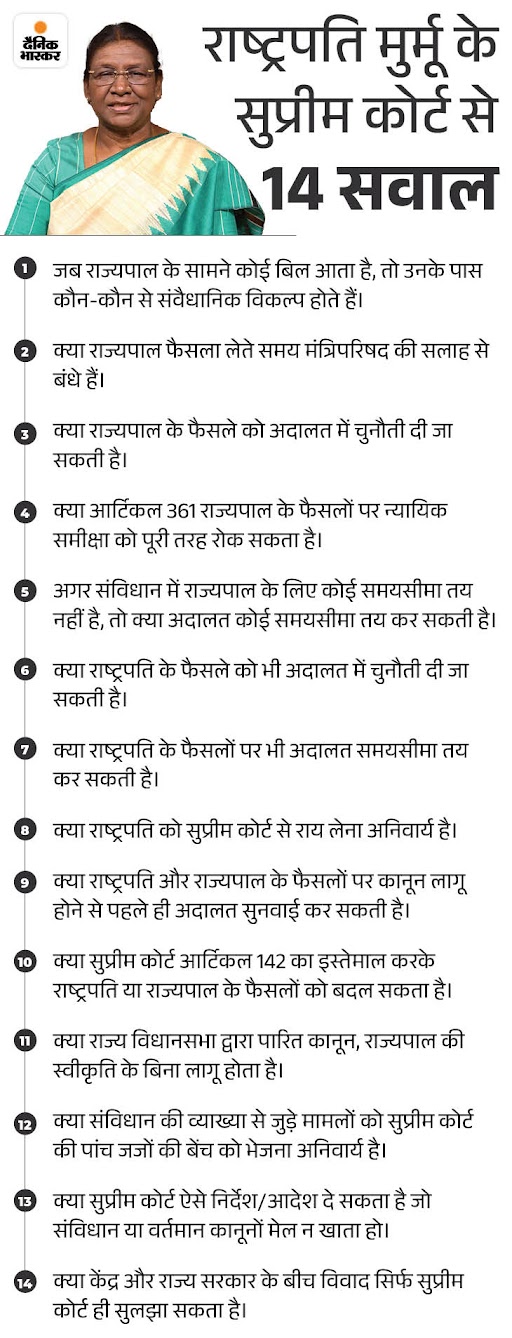
What happened in the last 9 hearing …
September 10: Solicitor General said- only 20 bills pending since 1970
Solicitor General Tushar Mehta said, “From 1970, only 20 bills have been pending with the President, while 90% bills pass in a month.” The CJI objected to this and said that it is not appropriate to conclude only from the figures. If the data given by the states is not considered then you will not be considered.
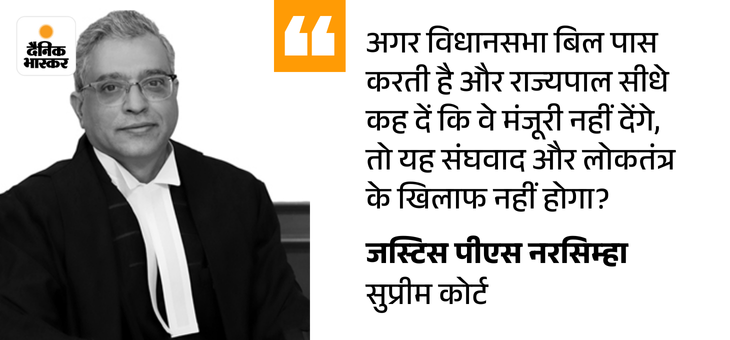
September 9: Government of Karnataka Boli- President and Governor only nominal heads
The Congress -led Karnataka government argued with this and said that under the constitutional system, the President and the Governor are only nominal. Both are obliged to work on the help and advice of the Council of Ministers at the Center and States.
On behalf of the Government of Karnataka, Senior Advocate Gopal Subramaniam told a 5-judge bench headed by Chief Justice BR Gavai that the satisfaction of the Governor for action on the bills passed in the assembly is the satisfaction of the Council of Ministers. Read full news …
September 3: Government of Bengal said- Governors should take immediate decision on the bill Earlier, on 3 September, the West Bengal government argued in the Supreme Court that the wishes of the public as a bill could not be subject to the wishes of the governors and the President as the executive has been banned from interfering in the legislative process.
The TMC government had argued that the Governor should immediately decide the bills sent from the Legislative Assembly, as they have no right to stop the approval. The Governor cannot question the will of the sovereign and cannot check the legislative capacity of the bill passing in the assembly, which comes under the jurisdiction of the judiciary.
September 2: Consider bills is not the job of the President-Governor The Tamil Nadu and the West Bengal government argued in favor of fixing the deadline for the President and the Governors to take a decision on pass bills in the assembly. Kapil Sibal, appearing for West Bengal, argued that the President and the Governors have no personal work on the issue of considering the bills. They work to help the Center and State Council of Ministers. Read full news …
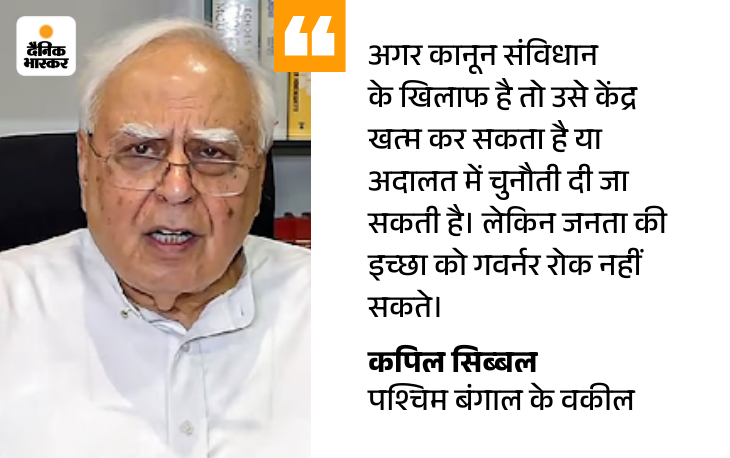
August 28: Center said- cannot give writ petition in state Supreme Court
The central government said that the President and the Governor cannot file a writ petition in the state Supreme Court against the action on the bills passed by the Assembly. The Center said that the state governments cannot use Article 32. Because fundamental rights are for common citizens, not for states. Read full news …
August 26: BJP ruled states said- Court cannot decide a time limit
On August 26, the BJP ruled states presented their stand in the court. Lawyers of BJP ruled states including Maharashtra, Goa, Uttar Pradesh, Haryana, Chhattisgarh, Odisha and Puducherry said that the court does not have the right to approve the bills.
On this, Chief Justice of India (CJI) BR Gawai asked that if a person would ban the bills from 2020 to 2025, should the court sit helpless? The CJI asked the central government whether the Supreme Court should renounce its responsibility as the ‘Patron of the Constitution’?
On behalf of Maharashtra, senior advocate Harish Salve said that only the Governor or the President has the right to approve the bills. In the constitution, it should be assumed that there is no system as the bill has passed without approval. Read full news …
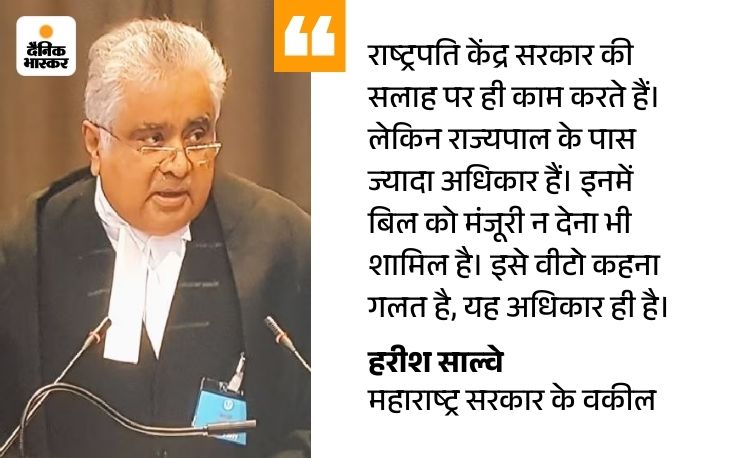
August 21: Center said- States should talk and settle disputes
The central government said in the Supreme Court that if the Governor does not take any decision on the Bills, then the states should solve the resolution instead of the court. The Center said that all the problems cannot be solved by the courts. Dialogue should be given priority in democracy. We have been here for decades. Read full news …
August 20: SC said- Government cannot follow the will of governors
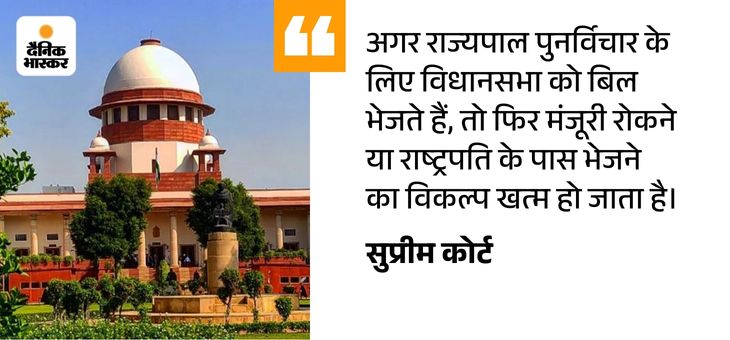
The Supreme Court said that the elected governments cannot follow the will of the governors. If a bill passes from the state assembly and comes to the Governor for the second time, the governor cannot send it to the President. The court said that the governor does not have the right to stop the approval indefinitely.
August 19: SRakar Boli- Can the court write again
In the first day hearing on the matter, Attorney General R Venkatarmani on behalf of the Central Government said on the April 2025 decision of the Supreme Court that whether the court can re -write the constitution? The court looked at the Governor and the President as a general administrative officer, while he is a constitutional post. Read full news …
Controversy started from Tamil Nadu …
The case was raised from the dispute between the Tamil Nadu Governor and the State Government. Where the state government bills were stopped from the governor. The Supreme Court on 8 April ordered that the Governor has no veto power.
It was said in this decision that the President will have to take a decision on the bill sent by the Governor within 3 months. The order came to light on 11 April. The President then sought opinion from the Supreme Court in the case and asked 14 questions. Read full news …

,
Read this news related to Supreme Court …
The Supreme Court said- quarrel between neighbors is common: cannot consider it a crime; Karnataka High Court’s decision canceled
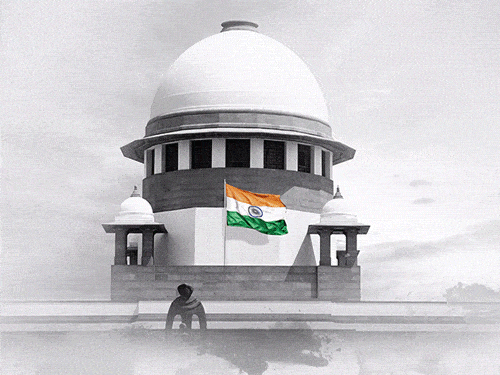
The Supreme Court said on Tuesday- it is common for neighbors to quarrel. If there is a quarrel, debate and scuffle between the neighbors, it cannot be considered a crime under the abetment of suicide (Section 306 of the IPC). A bench of Justice Biwi Nagaratna and KV Vishwanathan canceled the Karnataka High Court’s decision in which a woman was sentenced to three years for neighbor’s suicide. The court said, “Section 306 makes a case of abetment to suicide only when it is clear that the accused deliberately forced the victim to commit suicide.” Read full news …


